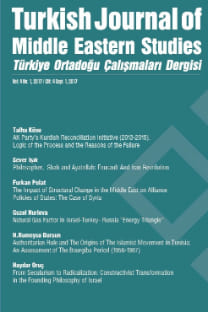Çözüm Sürecinin Yükseliş ve Düşüşü
Bu çalışma Mart 2013’de fiili ateşkes ile başlayıp 2015 yılının yazına kadar süren ve Çözüm Süreci olarak tanımlanan ve Kürt sorununa kalıcı çözüm bulmaya çalışan girişimi barış süreçlerinin mantığı içerisinde ele alarak değerlendirmektedir. Süreci başlatan temel dinamikler ve süreç esnasında atılan somut adımlar değerlendirilmektedir. Sürecin istenen şekilde netice verememesi, veya tıkanıklığa uğramasının nedenleri yerel ve bölgesel dinamikleri ile ele alınmaktadır. Kürt hareketinin siyasi tercihleri, siyaset içerisinde değişen güçler dengesi ve Suriye Savaşının Kürt Hareketi açısından oluşturduğu yeni imkanlar ve Türkiye açısından oluşturduğu belirsizlikler sürecin temel açmazları olarak ele alınmıştır. Sürecin fiili olarak sona ermesine karşın, henüz bir tıkanıklık aşamasında olduğu ve şartların olgunlaşması ile farklı bir şekilde yeniden başlayabileceği öngörülmektedir. Ancak bundan sonraki süreçlerde PKK ile doğrudan ilintili aktörlerin muhataplık durumunun kabul edilebilirliği azalmıştır. Bölgesel bağlam ise yeni bir sürecin önünü açacak veya tıkanmasını devam ettirecek temel belirleyici olacaktır.
AK Party’s Kurdish Reconciliation Initiative (2013-2015): Logic of the Process and the Reasons of the Failure
Reconciliation Process (2013-2015) is the most systematic andcomprehensive initiative during the Republican history to find a sustainablesolution to Turkey’s century old “Kurdish Question”. ReconciliationProcess is characterized as a peace process in this study. ReconciliationProcess came to an end after the PKK’s attacks to Turkish security forcesin July 2015. This study examines the reasons behind the failure of theReconciliation Process and discusses the means to overcome the stalematesituation. Political decisions and preferences of the “Kurdish Movement”;changing power dynamics between the main counterparts of the process;the opportunities that the ongoing civil war in Syria provided the “KurdishMovement” and the ambiguities that the Syrian Civil War generated forthe Turkish authorities are cited as the main shortcomings that derailedthe Process. This study argues the current situation is a stalemate withinthe Process. Possible steps and conditions too revitalize the Process arediscussed.
___
- Tonge, Jonathan. Comparative peace processes. John Wiley & Sons, 2014., p.7; Darby, John, Roger Mac Ginty, and Roger Mac Ginty, eds. The management of peace processes. Palgrave Macmillan, 2000, p: 6-8.
